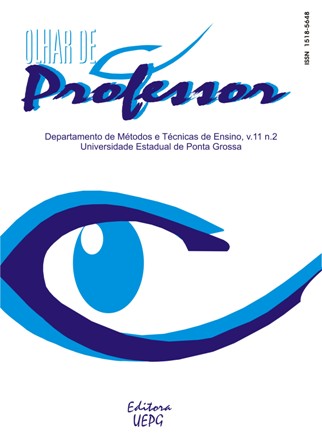ESCRITA E ORALIDADE: HORA E VEZ DA FALA (WRITING AND SPEAKING: THE SPEAKING TIME) - Doi: http://dx.doi.org/10.5212/OlharProfr.v.11i2.403415
Main Article Content
Abstract
Neste texto proponho-me, primeiramente, revisitar a história da escrita situando a oralidade; a seguir, com apoio da sociolinguística variacionista, refletir sobre alguns aspectos do funcionamento da língua oral bem como sobre a noção de erro; e, por fim, considerar e sugerir condições para um melhor aproveitamento e desenvolvimento da habilidade oral no ensino de língua materna.
Palavras-chave: Escrita. Oralidade. Ensino.
In this text, firstly I’d like to revisit written history situating orality, and secondly within the variational sociolinguistics support to reflect over a few aspects of the function of oral language as well as error notion, and at last, to consider and suggest conditions for a better advantage and development of the oral skill in mother tongue teaching.
Keywords: Written. Orality. Teaching.
Downloads
Article Details
Authors who publish in this journal agree with the following terms:
a) Authors keep the copyrights and concede the right of its first publication to the magazine. The work piece must be simultaneously licensed on the Creative Commons Attribution License which allows the paper sharing, and preserves both the author identity and the right of first publication to this magazine.
b) Authors are authorized to assume additional contracts separately, to not-exclusively distribution of the paper version published in this magazine (e.g.: publish in institutional repository or as a book chapter), with the author identity recognition and its first publication in this magazine.
c) Authors are permitted and stimulated to publish and distribute their papers online (e.g.: in institutional repository or on their personal webpage), considering it can generate productive alterations, as well as increase the impact and the quotations of the published paper.
d) This journal provides public access to all its content, as this allows a greater visibility and reach of published articles and reviews. For more information on this approach, visit the Public Knowledge Project, a project that developed this system to improve the academic and public quality of the research, distributing OJS as well as other software to support the publication system of public access to academic sources.
e) The names and e-mail addresses on this site will be used exclusively for the purposes of the journal and are not available for other purposes.

This work is licensed under a Creative Commons Attribution 4.0 International License.





